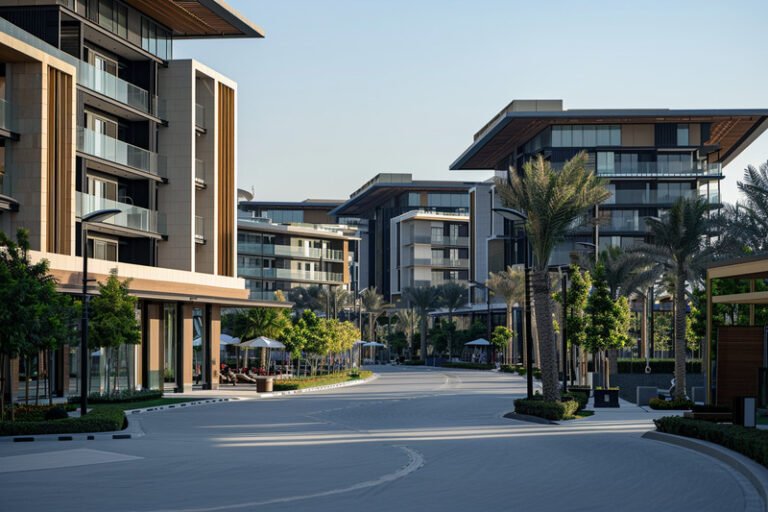Legal Considerations When Buying Off-Plan Properties

Buying off-plan properties in Dubai presents unique legal challenges and opportunities. The emirate's real estate market is dynamic, with regulations evolving to protect investors and maintain market stability. When considering an off-plan purchase in Dubai, you're not just buying property, but investing in the city's future growth.
Understanding Dubai's specific laws and regulations is crucial. The Real Estate Regulatory Agency (RERA) plays a vital role in overseeing off-plan developments. Investors must be aware of the Escrow Law, which safeguards buyer deposits, and the Interim Property Register (Oqood) system for registering off-plan sales.
Contract terms in Dubai often differ from international standards. Pay close attention to completion dates, handover procedures, and quality specifications. Dubai's Off-Plan Property Sales Law provides important protections, but buyers should still exercise due diligence.
Developer reputation is particularly important in Dubai's market. Research the developer's track record, financial stability, and compliance with RERA regulations. This can help mitigate risks associated with project delays or potential cancellations.
Let us help you find the perfect property. Contact us to get started.
Payment plans in Dubai can be complex. Understand the schedule, penalties for late payments, and any mortgage pre-approval requirements. Some developers offer attractive post-handover payment plans, but these may come with legal implications.
Consider potential changes in Dubai's property laws. The government periodically introduces new regulations that could affect your investment. Stay informed about upcoming legislative changes and their potential impact on off-plan purchases.
Key Takeaways
Buying off-plan properties in Dubai requires careful consideration of legal aspects to protect your investment. The Dubai Real Estate Regulatory Agency (RERA) oversees property transactions, ensuring transparency and safeguarding buyers' interests. Understanding Dubai's unique real estate laws and regulations is crucial before committing to an off-plan purchase. This guide outlines key legal considerations specific to Dubai's property market, helping you navigate the process with confidence and minimize potential risks.
Review the Sale and Purchase Agreement (SPA) meticulously. Focus on payment plans, completion timelines, and the developer's obligations. Ensure the contract includes provisions for refunds or compensation in case of project delays or cancellations.
Verify the developer's RERA registration and confirm that your payments will be protected in an escrow account. This safeguards your investment and ensures funds are used solely for the project's construction.
Negotiate clear completion dates and penalties for delays. Include a long-stop date as the ultimate deadline, after which you can seek a full refund if the property isn't delivered.
Confirm all necessary approvals from Dubai Municipality and compliance with local building codes. Verify that the project adheres to Dubai's zoning laws and has obtained all required permits.
Understand Dubai's mortgage regulations and financing options for off-plan properties. Check your eligibility and align the payment schedule with your financial capabilities before signing the SPA.
Contract Terms and Conditions
In Dubai's dynamic real estate market, scrutinizing off-plan property contracts is crucial. Key areas to focus on include payment schedules, developer responsibilities, and completion deadlines. Understanding the consequences of delays or breaches is vital. Examine clauses regarding design modifications, cancellation terms, and penalties. Review warranty coverage and the process for addressing post-completion issues. Be aware of potential additional fees or charges. It's highly recommended to have a legal professional specializing in Dubai real estate review the contract before signing.
Pay close attention to Dubai-specific regulations, such as the Real Estate Regulatory Agency (RERA) guidelines. Ensure the contract complies with local laws and includes provisions for registering the property with the Dubai Land Department.
Check for clauses related to service charges and maintenance fees, which are common in Dubai's property market. Understand the handover process and any associated costs or requirements unique to Dubai.
Consider provisions for dispute resolution, preferably through Dubai's legal system. This can save time and money if issues arise later.
Verify that the contract includes details about the developer's escrow account, as mandated by Dubai law. This protects your payments and ensures funds are used for the project.
Deposit Protection Schemes
Deposit protection schemes are crucial when buying off-plan properties in Dubai. These schemes safeguard your investment if a developer fails to complete the project or goes bankrupt. The Real Estate Regulatory Agency (RERA) oversees these schemes in Dubai, ensuring developer compliance with regulations. When making a deposit, the developer must place your funds in a RERA-approved escrow account, managed by a third-party bank.
Developers can only access funds at specific construction stages, predetermined and monitored by RERA. It's essential to verify the developer's RERA registration and approved escrow account before making payments.
Buyers should receive regular updates on construction progress and fund utilization. If a project faces delays or cancellation, you're entitled to a refund through the protection scheme.
Always review the deposit protection scheme terms in your purchase agreement carefully. This ensures you understand your rights and the developer's obligations under Dubai's real estate regulations.
Completion Dates and Delays
In Dubai's bustling real estate market, off-plan property purchases require careful consideration of completion dates and potential delays. Developers typically provide estimated completion dates, but these aren't guaranteed. Various factors, including construction issues, material shortages, or unforeseen circumstances, can cause delays.
To safeguard your investment, ensure your contract includes specific clauses addressing completion dates and potential delays. These should outline the developer's obligations, penalties for late completion, and your rights in case of significant delays. Negotiate a long-stop date, which serves as the final deadline for completion.
Be aware of force majeure clauses in Dubai contracts, which can absolve developers of responsibility for delays caused by events beyond their control. These may include natural disasters or government interventions.
Review all clauses carefully and consider seeking legal advice to fully understand their implications in the context of Dubai’s real estate laws. If you are unsure about any aspect of the clauses in your real estate agreement, it is important to seek legal advice from a qualified lawyer who specializes in real estate law in Dubai. They can help you understand the legal implications and responsibilities associated with the clauses, and can also provide guidance on how to navigate any potential challenges. Additionally, it is advisable to budget for property purchase legal fees in order to ensure that you have the necessary resources to seek legal advice and ensure that your real estate transaction is in compliance with Dubai’s laws and regulations.
Stay informed about Dubai's Real Estate Regulatory Agency (RERA) regulations regarding off-plan properties and completion timelines.
Developer Track Record
When investing in off-plan properties in Dubai, a developer's track record is crucial. Thorough research into their history, completed projects, and customer satisfaction is essential. Investigate their ability to deliver on time and to specifications. Check for any legal issues or disputes they've been involved in.
The Dubai Land Department offers records of registered developers and their projects. Online forums and property websites provide customer reviews and experiences. Don't hesitate to ask developers directly about past projects and request references from previous buyers.
Visit completed developments to assess construction quality and finishes. This hands-on approach gives you a real sense of what to expect from your investment.
Consider the developer's financial stability and reputation in the market. A strong financial position indicates their ability to complete projects even in challenging economic conditions.
Planning Permissions and Regulations
Understanding planning permissions and regulations is crucial when purchasing off-plan property in Dubai. Verify that the developer has obtained all necessary approvals from the Dubai Land Department and other relevant authorities. These permissions ensure compliance with local zoning laws, building codes, and environmental regulations.
Review the project's master plan and confirm it aligns with your expectations. Check for any restrictions on property usage or future development in the area. Verify that the developer has secured required construction permits and that the project timeline is realistic.
Request copies of all relevant documents, including the building permit, environmental impact assessment, and other regulatory approvals. Consider having a legal professional review these documents to ensure everything is in order.
Examine the planning permissions and regulations thoroughly to make an informed decision and safeguard your investment in Dubai's off-plan property market. This due diligence will help you avoid potential legal issues and ensure a smoother purchasing process.
Financing and Mortgage Considerations
Financing and understanding mortgage options are crucial when buying off-plan properties in Dubai. Assess your mortgage eligibility and choose the best loan type for your financial situation. Dubai banks offer mortgages for off-plan properties, but typically require larger down payments of 30-50% compared to completed properties. Mortgage approval isn't guaranteed, even after making a down payment to the developer. Banks evaluate creditworthiness and property value before granting loans.
Consider the payment schedule for off-plan properties, which often involves installments throughout construction. Ensure you can meet these payments alongside other financial obligations. Be mindful of potential interest rate fluctuations during the construction period, as they can affect mortgage payments.
Consult with a financial advisor or mortgage specialist to fully understand your options and the long-term financial implications of your investment. They can provide valuable insights into Dubai's real estate market and help you make informed decisions.
Conclusion
Legal Considerations When Buying Off-Plan Properties in Dubai
Dubai's off-plan property market offers exciting investment opportunities, but it requires careful legal consideration. Buyers must navigate unique regulations and practices specific to the emirate. Understanding Dubai's real estate laws, developer obligations, and investor rights is crucial. Key areas to focus on include contract terms, deposit protection schemes, completion guarantees, and developer credibility.
Additionally, verifying project approvals, escrow accounts, and financing options is essential. By addressing these legal aspects, investors can better protect their interests and maximize their chances of a successful off-plan property purchase in Dubai.
Contract review is paramount. Ensure all terms are clearly defined, including payment schedules, handover dates, and quality specifications. Look for clauses that protect you from delays or project cancellations.
Verify the developer's registration with the Dubai Land Department and check their track record. Research their completed projects and financial stability to assess their reliability.
Confirm that all necessary approvals and permits are in place for the project. This includes master plan approval, building permits, and environmental clearances.
Understand Dubai's off-plan payment structure and escrow account requirements. Ensure your payments are protected and only released to the developer based on construction milestones.
Consider seeking legal advice from a Dubai-based real estate lawyer. They can provide invaluable guidance on local laws and help you navigate any complex legal issues.
Let us help you find the perfect property. Contact us to get started.





